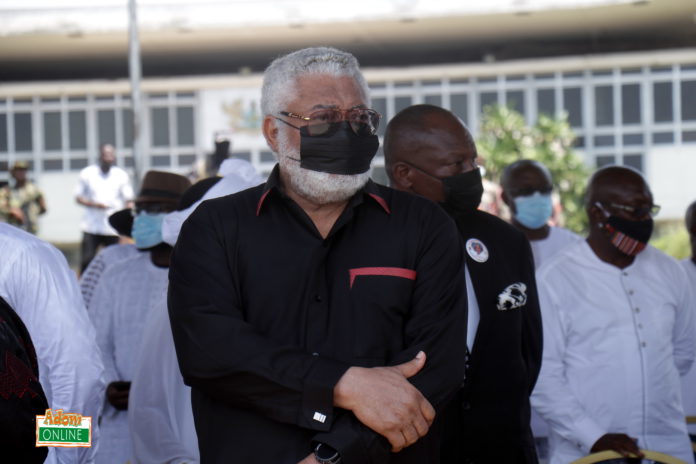Security analyst, Colonel Festus Aboagye, says former President Jerry John Rawlings deserves a lot of credit for the regional stability being enjoyed in the Economic Community of West African States (ECOWAS) sub-region.
He said though the former President may have to share this acclaim with other leaders of the member states of ECOWAS, Mr Rawlings’ contributions to peacekeeping and conflict resolution in the sub-region cannot be understated.
Speaking on JoyNews’ Newsfile Saturday, the security expert said Ghana’s contribution to peacekeeping and conflict management in the sub-region under the leadership of Mr Rawlings had led to the creation of ECOMOG which saw to the temporary ceasefire in Liberia.
“So to start with, the country descended into a very long civil war from eve of Christmas 1989. At the time you’d know that the PNDC was still in power. Unfortunately, this was at the time when he was under pressure to transition from revolution to democracy.
“Now because of the economic constraints, that I have alluded to, the Ghana Armed Forces were not very well endowed and yet he managed together with Nigeria, together with Gambia whose leader Jawara Dawda was the chair of ECOWAS at the time to mobilise what became known as ECOMOG to intervene with or without Charles Taylor’s consent.
“Of course the pretext was that Ghana was going to evacuate Ghanaian citizens and therefore the grounds was humanitarian, but of course in the absence of a ceasefire or cessation of hostilities or peace agreement, Ghana and ECOMOG ended up undertaking a peace enforcement role. And in spite of many challenges including difficulties with Nigeria, Ghana still stuck with ECOMOG, until his chairmanship of ECOWAS in 1994,” he said.
Col. Aboagye stated that Mr Rawlings’ insistence on using negotiations instead of military action to address the conflict in Liberia ultimately led to several Peace Accords which brought some peace to Liberia.
ALSO READ:
This further paved way for the ECOWAS to craft the revised treaty of 1993 and to establish the protocol relating to the mechanism for conflict prevention, management, resolution and peacekeeping in 1999.
“Now 1994 is very critical, Ghana all along subscribed to the doctrine of engaging with the players in Liberia to find an exit centered on elections. And Nigeria’s approach was to use the military option in order to defeat Charles Taylor on the battlefield.
“It took all those years from August 1990 when ECOMOG went into Liberia until about 1994, 1995 during the chairmanship of Rawlings as ECOWAS chairman for ECOWAS to now realise that the military option was not going to work. So the only option then was Ghana’s belief in the doctrine of engagement.
“So we would recall that about 1994, 1995 , 1996 we had the Accra and Akosombo series of meetings which created the conditions now but of course regional politics come in and Nigeria was not very happy that a small player like Ghana was going to take the credit for ending the conflict in Liberia and so it continued slightly into 1996 when he had left the scene for the Abuja Accord now to cement peace,” he said.
He further added that, “without Ghana I should say Nigeria’s legitimacy which was questioned as a Pariah state might have had implications for the conflict resolution effort within Liberia, so Ghana’s role was pivotal…So a bit of the credit also goes to JJ Rawlings. “
Colonel Aboagye stated that lessons from the war had also helped shape the ECOWAS’ strategy when it came to peacekeeping and maintaining order and stability in the sub-region.

